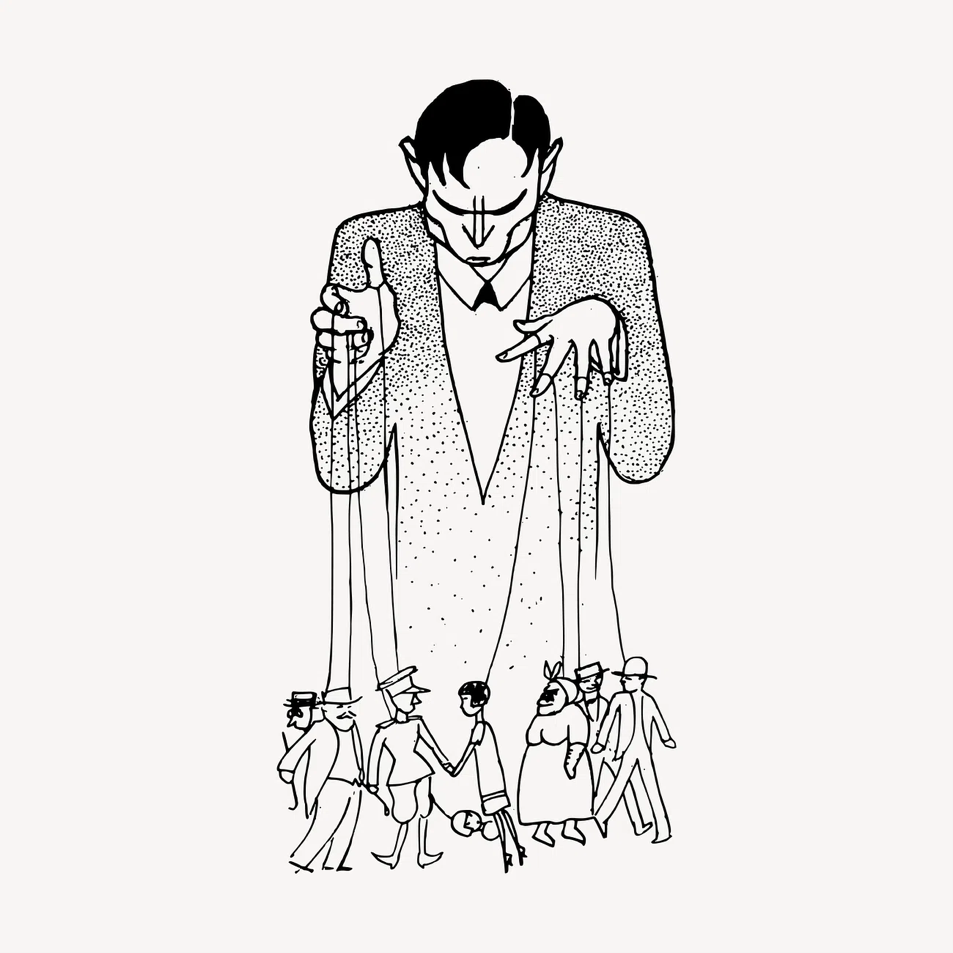Sophie Gibert (MIT), "The Wrong of Wrongful Manipulation"
Philosophy and Public Affairs, 2023
Picture the image most associated with the term manipulation. It's a scary-looking image of a puppeteer, controlling someone's movements by pulling their strings. This is a metaphor. After all, manipulating someone is very different from using physical force to maneuver their limbs. But it’s an evocative one. What it evokes is the idea that, when you manipulate someone, you make it so that they no longer act for themselves. You undercut or co-opt their agency. And that this is what’s sinister about manipulation, when there is something sinister about it.
In other words, the image evokes the idea that manipulation is wrong, when it is wrong, because it prevents autonomous action. Of course, it’s highly contested what autonomous action is—what distinctive relation must hold between an agent and her action, or an agent and her motivations, such that the action counts as her own. Some think that, for an action to be autonomous, it must be motivated by something the agent identifies with or endorses. Others think it must be motivated by reason, not instinct. Still others say that part of what it takes for an action to be one’s own is that its causal history includes no instances of wrongful manipulation. Of course, this last account won’t be useful to someone who wants to explain the wrong of wrongful manipulation by appealing to its impact on autonomous action. Whatever it is to act autonomously, though, the basic idea is that the wrong of wrongful manipulation has to do with its undermining autonomy in this action-theoretic sense.
This idea has come under attack over the past two decades, with various people arguing that manipulation, understood in one way or another, is compatible with this or that theory of autonomy in action. I find these arguments compelling. However, I think no one has departed radically enough from the underlying picture. On the dominant view, the wrong of wrongful manipulation still can be understood in non-moral, psychological terms. I call this view the Reasoning View. It says manipulating someone is wrong, when it is wrong, because it alters their practical reasoning in a particular way—it either circumvents it, subverts it, or affects it non-rationally.
In my paper, I argue that the Reasoning View is false. In its place, I defend what I call the Reductive View. On the reductive view, manipulating someone is wrong when and because it infringes one or more of their other rights—specifically, their non-interference rights, or negative rights. The view is called “reductive” because it implies that the wrong of wrongful manipulation is nothing over and above the wrong of infringing other rights.
The argument has two parts. First, I argue that the Reasoning View is vulnerable to systematic counterexamples, and that the Reductive View provides the recipe for generating them. For example, I argue that whether a given way of subverting someone's reasoning is wrongfully manipulative depends on whether it encroaches on their domain of non-interference. Basically, it depends on whether the influence occurs in their domain, or in yours. Here is one example.
Suppose you are negotiating a merger with another company. You know their CEO has a big ego. When he feels especially self-important, he tends not to properly evaluate deals, and to overvalue, even by his own lights, temporary improvements to his image. It doesn't seem wrongfully manipulative to use this to your advantage—to shower him with praise, dedicate staff to cater to his every whim, subtly disparage his enemies, and then make an offer that trivially benefits his image but is otherwise worse for him and better for you. In relationships like this one, that kind of behavior is totally fair game. You would not be out of bounds in employing it.
Still, there are ways to wrongfully manipulate someone during a business negotiation. For instance, suppose that by bringing up deeply personal information about the other CEO during the meeting (e.g., alluding to his private history of drug use), you can provoke feelings that will lead him to reason less well in the moment. Using this to your advantage does seem wrongfully manipulative. But the difference does not lie in the impact on reasoning, for we can stipulate that the CEO is disposed to make the very same errors in reasoning when he feels self-important as when he feels violated or angry. Rather, it lies in the fact that you step out of bounds. Among the rights and duties that structure the relationship between business adversaries are various privacy rights, and you infringe one of these. As the Reductive View predicts, it is wrongfully manipulative to subvert an adversary’s reasoning by infringing their privacy rights, but not to subvert their reasoning per se.
The second part of my argument is to diagnose the appeal of the Reasoning View. As we’ve seen, there is a sense in which the Reasoning View vindicates the powerful and widespread idea that manipulation is wrong, when it is wrong, because it threatens our autonomy. However, as I argue, adopting the Reasoning View is not the only way to vindicate that idea; nor is it the best way to do so.
People miss the alternative because they conflate two different senses of autonomy. On the one hand, there is autonomy in the action-theoretic sense: a relation between an agent and her action that makes it her own. On the other hand, there is autonomy as a moral or political notion: the thing we point to when we demand to control our own lives. In this sense, autonomy is a set of rights that secures each of us a discretionary sphere, or domain of rightful control—a domain that extends at least as far as the edges of our bodies, secured by our bodily rights, but plausibly further, to encompass certain domains of information and decision-making, among other things.
I am by no means the first to distinguish these two notions of autonomy. But the distinction is crucial here, for one way you can threaten someone's autonomy is by preventing them from acting autonomously. But another way you can threaten their autonomy is by infringing one or more of the rights that secure their domain of control. Even if we grant that we only have autonomy in the moral or political sense because we are beings capable of autonomous action, we cannot assume that the rights which constitute our autonomy in this sense are themselves rights to autonomous action. We cannot assume the two notions are one in the same.
That means there’s another option: wrongful manipulation is wrong because it threatens autonomy in the moral or political sense. It threatens the rights we hold against each other, which give us control of our lives. That just is the Reductive View. Manipulation is wrong, when it is wrong, because it infringes one or more of the target’s other non-interference rights.
Audio version of this post:




